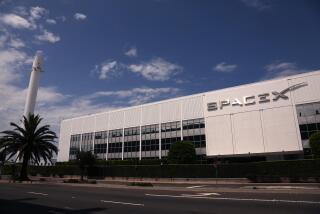Washington’s Snow Job on Asia Melts by the Sunny Pacific
Do I merely amuse myself or do I, more grievously, deceive, when I divine a higher profile for California in U.S. foreign policy? After all, here we are, fully three time zones (and 50 degrees Fahrenheit) away from all that Washington snow and gridlock. We’re out of it. But let’s make something special of a sheer coincidence: Last week, as the dynamic Ryutaro Hashimoto became Japan’s eighth prime minister in seven years, a development that scarcely warmed an already well-chilled Washington, a California institution was working quietly to de-ice major-power relations in Asia. Very quietly. There’s a lesson here--perhaps that government needs all the help it can get from a competent and involved California.
Since 1993, the San Diego-based Institute of Global Conflict and Cooperation has put together four meetings among China, Japan, Russia, the United States and, theoretically, the two Koreas (North Korea keeps promising but has yet to show up). Each nation sends to the host city--last week to Beijing--a tiny delegation of top officials, military types and prominent scholars. Far smaller than the mammoth gatherings of the 18-member Asia Pacific Economic Cooperation forum, these sessions are kept out of the media’s glare.
“The dialogue is entirely off the record,” says one official of the institute, which is associated with UC San Diego, “and that allows for freer discussion of ideas involving high-level people.” Last week, the Clinton administration was represented by James Steinberg, the State Department’s chief of policy planning, whom Secretary of State Warren Christopher, a former L.A. lawyer, recruited from the Santa Monica-based Rand Corp. The other nations sent comparable quality players.
Also last week, at the Pacific Club in Newport Beach, nearly 300 people showed up for a symposium sponsored by the Richard Nixon Library. Three foreign policy experts critiqued President Clinton’s foreign policy, from NATO to Asia. Toward the end of the informative, wide-ranging session, an Orange County tool-and-die executive stood up and practically shouted: “My company does business in Asia, especially China. The heck with NATO, what I want to know is what our government is doing to help business people in Asia. It’s a tremendous market, but it’s a tough one and we need help. Let’s work more on relations with Asia.”
Who says Orange County is out of it?
Everybody here knows that Asia and Latin America are the West Coast’s destiny. Japan, America’s most important Asian ally, is its second-biggest trading partner. Many Californians closely followed the selection of the volatile Hashimoto, who may inherit the wind of raging Japanese nationalism. Don’t let top Clinton administration officials, putting the best possible face on things, convince you they aren’t concerned. This is the same tough-as-nails former Japanese trade negotiator who gave at least as good as he got in the grueling auto talks last year with another tough bargainer, U.S. Trade Representative Mickey Kantor,. A passionate nationalist and a policy wonk not unlike Clinton, Hashimoto, 58, does believe in the utility of the U.S.-Japan relationship but is wholly capable of nurturing Japanese resentments and demonizing the U.S. to stay on top.
Winston Lord, assistant secretary of State for Asia, sees no big worries here: “Japan-U.S. relations are in better shape than ever,” he says. ‘Hashimoto is an opportunity, not a threat. Yes, he is a new breed--he is very forceful. But that’s good. Given the strength of his personality, maybe he will be better able to control that Japanese bureaucracy. We’ll see. The relationship is in good shape--very good shape.”
Stay cool, says Kantor, who respects Hashimoto: “I see him as a potentially stabilizing figure. He is a leader who says what he means. Time and again, he insists that the U.S. relationship is of vital importance. Of course, he could prove to be another seven-month wonder [like his five predecessors], but he is different from the others. While very competitive, he has the intellect to understand you as well as you understand yourself. He’s a tremendous negotiator.”
That he is; but he could also prove a royal pain in the Pac Rim. I can tell you this: When I telephoned snowbound Washington from sunny Los Angeles to talk to another “senior administration official,” the official’s wife picked up and then yoo-hooed her husband from the driveway, where he was shoveling the family car out from under. As he came to the phone he knew that I knew and that all of California would know that the official line on the new Japanese PM would be: “Everything is going to be A-OK” And that the official line is just that: a line, from an official.
“I have to laugh,” he said, taking the phone and moving dangerously close to unstuffy candor. “There I was outside in 5-degree cold shoveling the snow out of the driveway, and now here I am in the warm house trying to shovel the snow on you!”
Ah, but who says a good strong dose of California sunshine can’t melt the snow?
Tom Plate’s column runs Tuesdays. His e-mail address is [email protected]
More to Read
Get the L.A. Times Politics newsletter
Deeply reported insights into legislation, politics and policy from Sacramento, Washington and beyond. In your inbox three times per week.
You may occasionally receive promotional content from the Los Angeles Times.










